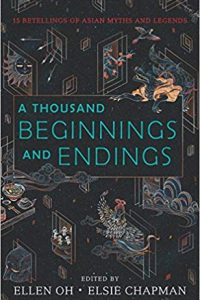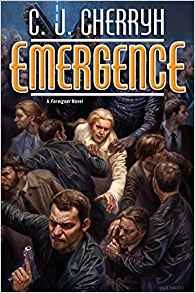Gary K. Wolfe Reviews Cyber Mage by Saad Z. Hossain
 Cyber Mage, Saad Z. Hossain (Unnamed Press 978-1-951213-28-2, $18.00, 350pp, tp) December 2021.
Cyber Mage, Saad Z. Hossain (Unnamed Press 978-1-951213-28-2, $18.00, 350pp, tp) December 2021.
In a remarkably short period, the Bangladeshi author Saad Z. Hossain has emerged as one of the most distinctive new voices in SF, earning comparisons to everyone from Joseph Heller to Quentin Tarantino, and as a major figure in an apparent renaissance in South Asian SF (see the next two books under review). Of course, “renaissance” might sound a bit grandiose or even misleading, since arguably fantastic tales in South Asian literature predate any notions of genre by several centuries. There certainly seems to be an upsurge in the availability of South Asian SFF, though, not only in anthologies but in the increasingly prominent work of writers such as Vandana Singh, Usman T. Malik, Gautam Bhatia, S.B. Divya, and of course Hossain himself. Since his first novel Escape from Baghdad in 2015, he’s published only a handful of works, most of which share a uniquely original vision of a post-labor late 21st century in which municipalities have become AI-managed corporations, airborne self-regenerating nanoparticles protect the population from toxic environments, and some highly irritable djinns have re-emerged into a world in which godlike AIs seem to challenge even their supernatural powers. I’m using the term “post-labor” here rather than the more common “post-scarcity” because Hossain makes it clear that, while human labor is no longer needed to sustain the society, poverty and scarcity of resources are still life-threatening problems for the “cardless,” those who don’t own shares in the municipal corporations.
Though it works perfectly well as a standalone, Cyber Mage brings back a few characters from 2017’s Djinn City, to which it’s partly a sequel, and shares important figures with The Gurkha and the Lord of Tuesday (reviewed here in August 2019), to which it can serve as a kind of prequel (the AI called Karma, which manages Katmandu in that novella, has just landed the contract at the end of Cyber Mage). Even the former airport management AI from last year’s story “The Endless” (from Jonathan Strahan’s Made to Order), thrown out of work when airports became obsolete, shows up again, now demoted to managing the physical plant of a high school, and is just as comically resentful as in that story.
We first meet the protagonist Marzuk as a fifteen-year-old gaming genius in Dhaka who has gained an awesome online reputation as the Cyber Mage, a master of the enormously popular Final Fantasy 9000 (which, in a nod to the actual founder of the franchise, is run by an AI named Sakaguchi, whom Marzuk views as “the greatest mind on Earth”). His closest online friend is KPopRetroGirl, but his heart belongs to Amina, a gorgeous but blase student at the local high school. Although he dropped out of school years earlier, and although he’s being courted by several colleges, Marzuk decides to enter ninth grade simply in hopes of being near Amina. Soon he finds himself the target of relentless humiliation by Hinku, a socially-connected, sadistic bully. Hinku is about as convincing as any bully I’ve seen in YA fiction, partly because Hossain details the quite deliberate strategies that so often enable bullies to get away with it. (Cyber Mage isn’t YA, though I suspect bright kids would enjoy it.) It soon becomes apparent that his only chance at retaliation rests with his genius at hacking online systems.
While Marzuk’s problematical high school career plays out in largely familiar YA terms, his encounters with AIs, djinns, and golems involve much higher stakes. He’s been following the actions of an assassin named Djibrel, who grew up as a violent street kid before being transformed into a golem by an ancient djinn named Bahamut, and who now specializes in decapitating his victims with a dragon-forged sword (cutting off heads is the only way to prevent the ambient nanotech from repairing wounds) and then hauling the bloody heads around in a sack. “This was the kind of antisocial behavior which gave him a bad name,” we are helpfully told. As rival djinns escalate their own power plays, Marzuk begins dreaming of a mysterious force he calls Kali, which he fears may be an emergent AI that has somehow figured out not only how to mess with his code, but to actually get into his brain. He later assigns the name to a shadowy web presence whom he meets and befriends. Meanwhile, a city-management AI named Karma is trying to take over Dhaka for its own reasons, and eventually Marzuk finds himself a central player in all these battles, finding unexpected allies in Kali and that ex-airport AI, while learning some surprises about friends like KPopRetroGirl. As usual with Hossain, there are moments of hilarious dark humor and snarky dialogue – he’s particularly good at nailing the whiny voice of that frustrated AI – as well as entertaining if at times overdetailed explanations of some obscure corners of web lore (my favorite is an archaic 11-line program called Left-Foot, underlying far more sophisticated later generations of programs, but without which no online avatar could turn left). While his future version of Final Fantasy might be so evolved as to be almost unrecognizable to contemporary players (of which I am not one), Hossain never quite lets the inside strategies of gaming overwhelm what is supposed to be an epic climactic struggle for the soul and future of Dhaka. At its best, despite its penchant for rambling explanations, this sort of thing recalls the early Neal Stephenson, but Hossain has a voice and a vision entirely his own, and Cyber Mage is as hugely entertaining and provocative as we’ve come to expect from him.
Gary K. Wolfe is Emeritus Professor of Humanities at Roosevelt University and a reviewer for Locus magazine since 1991. His reviews have been collected in Soundings (BSFA Award 2006; Hugo nominee), Bearings (Hugo nominee 2011), and Sightings (2011), and his Evaporating Genres: Essays on Fantastic Literature (Wesleyan) received the Locus Award in 2012. Earlier books include The Known and the Unknown: The Iconography of Science Fiction (Eaton Award, 1981), Harlan Ellison: The Edge of Forever (with Ellen Weil, 2002), and David Lindsay (1982). For the Library of America, he edited American Science Fiction: Nine Classic Novels of the 1950s in 2012, with a similar set for the 1960s forthcoming. He has received the Pilgrim Award from the Science Fiction Research Association, the Distinguished Scholarship Award from the International Association for the Fantastic in the Arts, and a Special World Fantasy Award for criticism. His 24-lecture series How Great Science Fiction Works appeared from The Great Courses in 2016. He has received six Hugo nominations, two for his reviews collections and four for The Coode Street Podcast, which he has co-hosted with Jonathan Strahan for more than 300 episodes. He lives in Chicago.
This review and more like it in the December 2021 issue of Locus.
 While you are here, please take a moment to support Locus with a one-time or recurring donation. We rely on reader donations to keep the magazine and site going, and would like to keep the site paywall free, but WE NEED YOUR FINANCIAL SUPPORT to continue quality coverage of the science fiction and fantasy field.
While you are here, please take a moment to support Locus with a one-time or recurring donation. We rely on reader donations to keep the magazine and site going, and would like to keep the site paywall free, but WE NEED YOUR FINANCIAL SUPPORT to continue quality coverage of the science fiction and fantasy field.
©Locus Magazine. Copyrighted material may not be republished without permission of LSFF.







